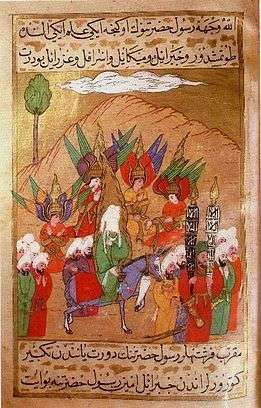Islamic mythology
| Part of a series on |
| Islam |
|---|
 |
|
Related topics |
|
Islamic mythology is the body of traditional narratives associated with Islam from a mythographical perspective.
Biblical stories in the Qur'an
Islam incorporates many Biblical events and heroes into its own mythology. Stories about Musa (Moses)[1] and Ibrahim (Abraham)[2] form parts of Islam's scriptures. The Qur'an retells in detail the Jewish tale of Joseph, who was sold to an Egyptian,[3] and the Christian tale of Mary, the mother of Jesus.[4] In both cases, it adds original details and an Islamic interpretation: for instance, in the Islamic version, Jesus speaks while he is still an infant,[5] and he is a miraculously-conceived human prophet, not the incarnation of God.[6]
Islamic creation narrative
According to the Qur'an, the skies and the earth were joined together as one "unit of creation", after which they were "cloven asunder".[7] After the parting of both, they simultaneously came into their present shape after going through a phase when they were smoke-like.[8] Some parts of the Qur'an state that the process of creation took 6 days,[9] Other parts provide detail about creation. 2 days to create the Earth,[10] 2 days to create the mountains, to bless the Earth and to measure its sustenance, total 4 days,[11][12] and then 2 more days to create the heavens and the stars.[13] In the Quran, the word "day" is used loosely to mean era, for example Surah 70 verse 4: "The angels and spirit will ascend to Him during a day the extent of which is fifty thousand years".
The Qur'an states that God created the world and the cosmos, made all the creatures that walk, swim, crawl, and fly on the face of the earth from water.[7] He made the angels, and the sun, moon and the stars to dwell in the universe. He poured down the rain in torrents, and broke up the soil to bring forth the corn, the grapes and other vegetation; the olive and the palm, the fruit trees and the grass.
God molded clay, earth, sand, and water into a model of a man. He breathed life and power into it, and it immediately sprang to life. And this first man was called Adam. God took Adam to live in a Paradise. God taught Adam the names of all the creatures, and then commanded all the angels to bow down before Adam. All of them bowed but Iblis, a jinn, refused to obey.
God placed Adam and Eve in a beautiful garden in Paradise, telling them that they could eat whatever they wanted except the fruit of a forbidden tree. Iblis tempted them to disobey God, and eat the fruit. When Adam and Eve had disobeyed God, God cast them out of Paradise. Muslim scholars are divided whether the Paradise, from which Adam and Eve were expelled, is the paradise in the heavens awarded to the righteous at the day of judgement or was it a paradise on earth.
Islam breaks somewhat with Judaism and Christianity in explaining why Adam and Eve ate the forbidden fruit. In the Hebrew account in Genesis, a snake tempts them to eat the fruit. While the Genesis creation narrative does not explicitly identify the snake with Satan, that Satan and the snake are the same being is claimed in the New Testament, in Revelation 12:9 and 20:2. In Genesis, Eve was tempted but Adam was not.[14][15] In contrast, the Qur'an states explicitly that Shaitan (Satan) tempted Adam and Eve to eat the fruit.[16] In contrast with Christian traditions, which sees Satan as a rebelling angel, Islamic tradition identifies Shaitan with a being called Iblis, who is a jinni, a spirit of fire smoke. In Islamic tradition, angels consist of light and never disobey God since they do not have free will.[17] Thus, it is said that angels are incapable of sin. In contrast, God created jinn with free will and they may choose to obey him or not, similar to the case of the human being. He told them to bow before Adam, but Iblis refused, claiming that his fiery nature was superior to Adam's flesh, which consisted of clay.[18] God cast Iblis out of his paradise, and Iblis vowed to tempt Adam and Eve's generations to corruption and to disobey God.
The Kaaba
According to Islamic mythology, God instructed Adam to construct a building to be the earthly counterpart of the House of Heaven. This was the giant black stone cube that Muslims call the Kaaba, the mosque revered in Islam as being sacred. Islamic literature states that the Kaaba was destroyed in the flood of Nuh (Noah).[19] Later, Ibrahim (Abraham) and Ismail (Ishmael) were instructed by Allah to rebuild the Kaaba on the old foundations.[20][21] As Ismail was searching for a stone to mark a corner with, he met with the angel Jibrail (Gabriel). Jibrail gave him the Black Stone. According to the hadith, the Black Stone is reported to have been milky white after being descended from Heaven but was rendered black due to the sins of the people, who had touched it. Another story may be that the black stone was stolen and along the way it broke and to fix it, the glues turned it black.
The Kaaba was originally intended as a symbolic house for the one monotheistic God. However, after Ibrahim's death, people started to fill the Kaaba with pagan idols. When Muhammad conquered Mecca, he cleaned out the idols from the Kaaba.[22] It now stands as an important pilgrimage site, which all Muslims are supposed to visit at least once if they are able. Muslims are supposed to pray five times a day while facing in the Kaaba's direction.[23]
Linear time
Judaism and Christianity have a lineal concept of time. The universe has been created only once and will be destroyed only once, and after its destruction it will be restored to perfection once and for all.[24] Likewise, Islamic mythology has a linear time perspective, running from the creation to the end of the world and the establishment of paradise on heaven. Qur'an 56 describes the end times, the judgment of the dead, and the eternal reward and punishment of saints and sinners—an eschatological mythology similar to the storyline of the Christian Book of Revelation and to some elements in the Jewish Book of Isaiah and Book of Daniel.
Beings
- Azrael - the angel of death
- Buraq - a winged steed with a very wide stride: it could place its hooves at the farthest boundary of its gaze. It would transport Muhammed and Abraham between cities.
- Darda'il - the angels who travel in the earth searching out assemblies where people remember God’s name. The Qur'an tells of two angels, Harut and Marut, sent down to test the people at Babylon.
- Israfil - the angel of the trumpet of doom
- Jibrail - the archangel Gabriel, an archangel who serves as a messenger from God
- Jinn - creatures of fire; along with angels and humans, one of the three intelligent species created by God
- Ifrit - Infernal jinn
- Kiraman Katibin - the two angels who record a person's good and bad deeds
- Mu'aqqibat - a class of guardian angels who keep people from death until its decreed time
- Maalik - the angel who guards the Hellfire
- Munkar and Nakir - the angels who test the faith of the dead in their graves
- Ridwan - the angel in charge of maintaining Jannah or Paradise
Places
- Barzakh - the state of the souls of the deceased before the Day of Judgment, when they will be assigned to Heaven or to Hell
- Garden of Eden - A Paradise where Adam and Eve lived before their Fall
- Jahannam - Hell; the abode of the wicked after the Day of Judgment
- Jannah - Heaven; the abode of the righteous after the Day of Judgment; contains the Garden of Paradise
- Kaaba - the sacred building that Muslims visit while on the Hajj (pilgrimage to Mecca). In Islamic mythology, Abraham (Abraham) and Ishmael built the Kaaba at God's command, to serve as the earthly counterpart of Jannah (Heaven). Adam built the original earthly Kaaba, but Abraham and his son had to rebuild it.
Events
- Creation - a six-stages creative act by God
- Fall of man - the loss of Paradise that resulted from eating the forbidden fruit; like Judaism,[25] and Orthodox Christianity, but unlike Western Christianity,[26] Islam does not hold that the Fall made man inherently sinful.[27]
- Deluge and Noah's (Nuh's) Ark- worldwide flood-event with a water vessel containing the remains of humanity and a set of all animals
- Qiyamah - the Day of Resurrection (and of the reward and punishment of the good and the wicked); a fundamental element of Islamic eschatology that incorporates much from the Jewish and Christian traditions
See also
References
- ↑ Qur'an 17:2
- ↑ Qur'an 14:35-52
- ↑ Qur'an 12:7-100
- ↑ Qur'an 19:16-33
- ↑ Qur'an 19:30-33
- ↑ Qur'an 19:35
- 1 2 Quran 21:30
- ↑ Quran 41:11
- ↑ Quran 11:7
- ↑ Quran 41:9
- ↑ Quran 41:10
- ↑ "Were the heavens and the earth created in six days or eight? - islamqa.info".
- ↑ Quran 41:12
- ↑ 2 Cor 11:3
- ↑ 1 Tim 2:13, 14
- ↑ Qur'an 7:20
- ↑ "The Muslim Belief in Angels".
- ↑ Qur'an 7:11-12
- ↑ M. J. Akbar. The Shade of Swords: Jihad and the Conflict Between Islam and Christianity. p. 5.
- ↑ "Kaaba Ka'aba Ka'ba". Archived from the original on 27 October 2009.
- ↑ "Kaaba: Brief History". at-Tazkirah: التذكرة.
- ↑ "Cmje".
- ↑ http://www.blessingscornucopia.com/Islam_Muslim_Islamic_Sunnah_The_Holy_Kaaba_and_Makkah_of_Islam.htm
- ↑ Eliade, p. 64-66
- ↑ The Jewish view of Jesus
- ↑ Original Sin - Catholic Encyclopedia
- ↑ For a discussion of the Islamic opinion about original sin, see here. See also Quran 6:164.
Sources
- Huston Smith. The Religions of Man. NY: Harper & Row (Perennial Library), 1965.
- Robert A. Segal. Myth: A Very Short Introduction. NY: Oxford UP, 2004.
- Zong In-Sob. Folk Tales From Korea, Third Edition. Elizabeth: Hollym International, 1982.
- Mircea Eliade. Myth and Reality. Trans. Willard R. Trask. NY: Harper & Row (Harper Torchbooks), 1968.
- The Holy Qur'an. Electronic Text Center, University of Virginia Library. Available online.
External links
![]() Media related to Islamic mythology at Wikimedia Commons
Media related to Islamic mythology at Wikimedia Commons
